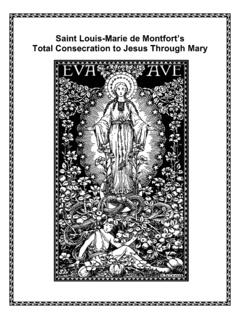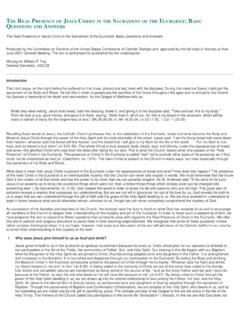Transcription of Jesus Opens the Veil
1 L esson 10 *February 26 March 4. Jesus Opens the Way through the Veil Sabbath Afternoon Read for This Week's Study: Heb. 9:24; Exod. 19:3, 4;. Heb. 12:18 21; Lev. 16:1, 2; Heb. 10:19 22; Col. 3:1. Memory Text: For Christ has not entered the holy places made with hands, which are copies of the true, but into heaven itself, now to appear in the presence of God for us (Hebrews 9:24, NKJV). W. hen the disciples returned from the Mount of Olives, right after Jesus had ascended to heaven, they were filled with joy and triumph. Their Master and Friend had ascended to a position of power over the world and had invited them to approach God in His name with the absolute confidence that God would respond favorably to their prayers (John 14:13, 14). Even though they continued in the world, attacked by the forces of evil, their hope was strong.
2 They knew that Jesus had ascended to prepare a place for them (John 14:1 3). They knew that Jesus was the Captain of their salvation and that He had opened a way into the heavenly homeland through His blood. The ascension of Jesus to heaven is central to the theology of Hebrews. It marks the beginning of Jesus ' rule and the beginning of His High Priestly ministry in our behalf. And more important, Jesus '. ascension marks the moment that the new covenant, which provides the means through which we can approach God boldly through faith, has been inaugurated. It is our privilege now to approach God with confi- dence through Jesus and the merits of His righteousness. * Study this week's lesson to prepare for Sabbath, March 5. 76. S unday February 27.
3 Jesus Before the Father Read Hebrews 9:24. According to this passage, what was the purpose of Jesus ' ascension to heaven? _____. _____. God instructed Israel that their males should go three times every year up to Jerusalem to appear before the Lord with an offering. The appointed times were the feast of Passover (Unleavened Bread), the Feast of Weeks (Pentecost), and the Feast of Booths (Exod. 23:14 17, Deut. 16:16). Passover celebrated Israel's deliverance from Egypt. Pentecost celebrated the barley harvest, and by the time of the New Testament, it was associated with the giving of the law at Sinai. The Feast of Booths celebrated God's care for Israel during their sojourn in the desert. According to the New Testament, all the Old Testament feasts also have prophetic significance.
4 Hebrews 9:24 describes Jesus ' ascension into the presence of the Father. He arrived at the heavenly sanctuary, the true one, in order to appear . before God with a better sacrifice (Heb. 9:23, 24, NIV) His own blood. Jesus fulfilled the pilgrimage feasts' prophetic significance with amazing accuracy. He died on the day for the preparation of the Passover at the ninth hour, the moment in which Passover lambs were sacrificed (John 19:14, Matt. 27:45 50). Jesus was resurrected on the third day and ascended to heaven to receive assurance that His sacrifice had been accepted (John 20:17, 1 Cor. 15:20), when the priest was to wave the sheaf of ripe barley as the firstfruits (Lev. 23:10 12). Then, He ascended 40 days later to sit at the right hand of God and inaugurate the new covenant on the Day of Pentecost (Acts 1, Acts 2).
5 The purpose of pilgrimage in ancient Israel was to behold the face of God (Ps. 42:2, NRSV). This meant to experience God's favor (Ps. 17:15). Similarly, the Hebrew expression to seek the face of God . meant to ask God for help (2 Chron. 7:14, Ps. 27:8, Ps. 105:4). This is the sense, in Hebrews, of Jesus ' ascension. Jesus ascended to God with the perfect sacrifice. Jesus also ascended to heaven as our Forerunner into the presence of God (Heb. 6:19, 20). He has made real the promise for the believers who journey, seeking a homeland, desiring a better country, looking forward to the city .. whose architect and builder is God (Heb. 11:10, 13 16, NRSV). Again, why should the reality of what Christ has done, not only on the cross but also what He is doing now in heaven, give us assurance of salvation?
6 _____. 77. M onday February 28. God's Invitation Read Hebrews 12:18 21. What was the experience of Israel at Mount Sinai? _____. _____. When God called the Israelites from Egypt, His plan was to create a personal, intimate relationship with them. He said, You have seen what I did to the Egyptians, and how I bore you on eagles' wings and brought you to Myself ' (Exod. 19:3, 4, NKJV). Thus, through Moses, God gave the necessary instructions to prepare the people to meet with Him. The people needed to consecrate themselves first (Exod. 19:10 15). Those who ascended to the foot of the mountain without preparation would die. Nevertheless, once the people had prepared them- selves for two days, then when the trumpet sounds a long blast' on the third day, God instructed that the people shall come up to the mountain' (Exod.)
7 19:13, ESV). He wanted them to have the expe- rience Moses and the leaders of the people would have when they ascended the mountain and beheld God, and ate and drank in His presence (Exod. 24:9 11, ESV). The people later recognized that they had seen God's glory and that it was possible for God to speak with man, and man still live ' (Deut. 5:24, ESV). But, when the moment came, they lacked faith. Moses explained years later: You were afraid because of the fire, and you did not go up into the mountain' (Deut. 5:5, ESV). Instead, they asked Moses to be their intermediary (Deut. 5:25 27, compare with Exod. 20:18 21). God's manifestation of His holiness at Mount Sinai was to teach the people to learn to fear, or respect, Him. The fear of the Lord leads to life, wisdom, and honor (Deut.
8 4:10; compare with Ps. 111:10, Prov. 1:7, Prov. 9:10, Prov. 10:27) and also to the lesson that He is merciful and gracious (Exod. 34:4 8). Thus, while God wanted Israel to come to Him, the people became afraid and requested for Moses to be their intermediary. The description in Hebrews of the events at Sinai follows, primarily, Moses' reminder to the people of their lack of faith and their apostasy with the golden calf, and how he was afraid of meeting God because of their sin (Deut. 9:19). The people's reaction was not God's plan for them; it was, instead, the result of their faithlessness. Because of Jesus , why should we not be afraid to draw near to a holy God? What are the conditions, however, for us to be able to draw near? _____. 78. T uesday March 1.
9 The Need for a Veil Veils have a double function. The term Hebrews uses for veil (kate- petasma) could refer to the screen of the court (Exod. 38:18), the screen at the entrance of the outer apartment of the sanctuary (Exod. 36:37), or the inner veil that separated the Holy Place from the Holy of Holies (Exod. 26:31 35). These three veils were both entrances and boundaries that only some people could cross. Read Leviticus 16:1, 2 and Leviticus 10:1 3. What warning do we have in these passages? _____. _____. The veil was a protection for the priests as they ministered before a holy God. After the sin of the golden calf, God said to Moses that He would not accompany them in the way to the Promised Land lest He consume them because they were a stiff-necked people' (Exod.)
10 33:3, NKJV). Thus, Moses moved the tent of meeting and pitched it far off, outside the camp (Exod. 33:7). After Moses interceded, however, God agreed to go with them in their midst (Exod. 33:12 20), but He estab- lished several measures to protect the people as He dwelled among them. For instance, Israel camped in a strict order that created a hollow square in the middle, where the tabernacle was pitched. In addition, the Levites camped around the tabernacle in order to protect the sanctuary and its furniture from encroachment by strangers (Num. 1:51, Num. 3:10). They were, in fact, a kind of human veil that protected the people of Israel: But the Levites shall camp around the tabernacle of the testimony, so that there may be no wrath on the congregation of the people of Israel.














